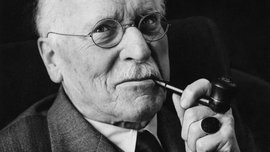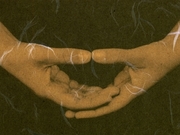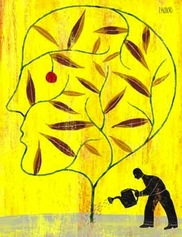"Risk nurtures resilience." - Kristen Lee
|
A podcast full of encouraging reminders from Sounds True on embracing our weirdness and offering yourself to an anxious world. So many nice momentS. One of the simple quotes that particularly resonates with me :
"Risk nurtures resilience." - Kristen Lee
0 Comments
This group of strangers met for 16 hours of group therapy facilitated by the founder of client-centered psychotherapy, Carl Rogers. Although the footage is dated, the principles of group therapy remain the same. Here, we taste what is possible for individuals when safety, authenticity and empathy are combined in interpersonal relationships.  It humbles my mind to think that throughout human history, personal and collective trauma has arguably impacted every man and woman at some point in their lives. There are profound losses that we all must face, such as the death of parents and friends. We may also face sudden accidents or life-altering sickness, and the recent fires across Victoria, NSW and Tasmania remind us that natural disasters can devastate lives from one day to the next. As a psychotherapist, every day I also see the cyclical traumas humans inflict upon each other: emotional, physical and sexual abuse, abandonment, and other behaviours that often pass from one generation to another when unresolved wounds are covered up. As buried wounds never loose their power, they soon corrupt our essential nature. While personal traumas can feel extremely isolating, in fact, traumatic events are unfortunately a normal part of life. Culturally, we would be better off not hiding our wounds from each other. I have noticed amongst my own friends, that when I share my own wounding, it gives permission for others to also be honest about theirs. The isolation instantly recedes. Empathy, a powerful healing force, can naturally flow. However, in many families and communities, the showing of wounding or grieving of traumas is not publicly encouraged or accepted. In fact, repressing emotions is often considered a sign of strength and a necessity for survival. Underlying this position is a fear of emotion, and a belief that emotions make us weak. Perhaps they do, temporarily. However a surrender to the intelligence of our evolutionary feelings is the necessary gate to all true healing... healing that leads to revitalisation and personal growth. This is where finding an empathic and well-trained psychotherapist or counsellor can be life changing. In my own work with trauma - both in my own life and with a wide array of clients, from physical and sexual abuse, to those leaving religious institutions and cults, to bereavement and life's many profound losses - I always begin by creating a safe place for the wound to express itself, to tell its own story, and eventually, for the individual grieve. From here, profound growth is possible. Recently, while speaking with Swinburne's Chair of Psychology and Director of Brain & Psychological Sciences Research Centre, Michael Kyrios, about my interest in the accelerated potential for personal growth as we face our mortality through traumatic events, he shared his own long-standing interest in what he called "Post Traumatic Growth". This term jumped out at me, and has become an important anchor as I continue my research into our human potential not only to heal, but to positively transform as a result of our most difficult experiences. On this blog, from time to time I'll be sharing some of the powerful research and techniques that I come across. Most recently, one of my teachers and mentors, Jane Holmes, shared with me the profound effects of a training she is currently undertaking in Somatic Experiencing with Peter Levine, author of Waking the Dragon. On his web site he writes: Somatic Experiencing® is a body-awareness approach to trauma being taught throughout the world. It is the result of over forty years of observation, research, and hands-on development by Dr. Levine. Based upon the realization that human beings have an innate ability to overcome the effects of trauma, Somatic Experiencing has touched the lives of many thousands. SE® restores self-regulation, and returns a sense of aliveness, relaxation and wholeness to traumatized individuals who have had these precious gifts taken away. Peter has applied his work to combat veterans, rape survivors, Holocaust survivors, auto accident and post surgical trauma, chronic pain sufferers, and even to infants after suffering traumatic births. If you have suffered an unresolved trauma in your life, you may consciously or unconsciously be living under its effects. While we cannot alter the past, we have enormous power to shape our attitude towards our experiences, and to create space in our lives for healing to take place, and to potentially transform us in ways we haven't yet imagined. If you are ready to talk about your feelings and experiences, you can be in touch to determine whether my approach is right for you.
Meanwhile, see the article below for one woman's unfolding story of trauma and "beating the odds" with Somatic Experiencing. This is a 3-part series from Annaliese Train, J.D. whose career practicing law and working in corporate America took a radical turn when she was diagnosed with MS. She is currently launching an SE®-based consulting practice called Healing Strategy and is writing her first book. In the following entries, she shares her experience from multiple disheartening diagnoses through discovering the benefits of SE and developing a new theory about MS and trauma. It felt like a one-two knockout of my mind, body, and spirit. First came the diagnosis in 2008 that I had an autoimmune disease called Multiple Sclerosis (MS). Having MS, as I learned, means my immune system was mistakenly attacking my own central nervous system: brain, spinal cord, and optic nerves. My energy reserves and emotions were paying a very heavy toll, not to mention the physical strains. It went from bad to worse in early 2009 when I was diagnosed with another autoimmune disease called Sjogren’s Syndrome. This meant that now my moisture-producing glands and connective tissues were under attack as well, adding a whole new arsenal of worries and discomforts. Was this the universe’s way, I wondered, of telling a fast-moving corporate go-getter to slow down and pay attention to her body? If so, then the universe could sure be one tough mother. But so was I.
Truth be known, I hadn’t been feeling consistently well for a long time. I had visited many specialists over the preceding two decades about a variety of what I thought were random health issues. They had ultimately manifested in a cacophony of bizarre symptoms including constricted breathing, unbelievable fatigue, burning feet, dry eyes and mouth, random yet continuous body sensations, twitches and tremors, intolerance to heat, numbness to my waist, and a dropped foot which made walking a challenge. In addition to the physical strain, all these mystery symptoms had been jeopardizing my cognitive and emotional world as well. Diagnoses had trickled in over the years identifying non-life-threatening irritations like Raynaud’s Disease (a circulatory disorder) and Irritable Bowel Syndrome. But identifying my MS and Sjogren’s was a completely unexpected shock. Who is ever prepared to hear they have two autoimmune diseases that are intent on shutting you down? Limiting your mobility? Making you go blind and use a cane or wheelchair? I certainly wasn’t. I was in the prime of my life, prime of my career, running my own business, and dreaming of starting a family. Attorney turned corporate girl, for years I was a hired gun living on Starbucks, skilled at launching new products and closing just about any type of sale. I lived in a very competitive world and felt that I was sitting comfortably atop the pile. Well, perhaps comfortably isn’t the word. I’d gotten really good at ignoring my body. Basic needs like sleeping, eating routinely, stretching, even taking bathroom breaks were shelved in pursuit of business. There was always another call, another client or contract to negotiate, another drive or flight or somewhere, or something seemingly urgent that needed to be done. My body was suffering. It finally gave out. The pair of ominous diagnoses I received in 2008 and 2009 led me quickly into the pharmaceutical world of western medicine. Welcome to the land where pills and shots were a significant part of my new autoimmune life. I was in denial and planned to pop the prescribed pills and keep working. Throughout 2009 and 2010 prescriptions for my various “chemical cocktails” kept growing and shifting till it felt like I was falling into a pharmaceutical rabbit hole. By December 2010 I was relapsing again. At my neurologist’s advice, I finally conceded the point and stopped working. We upped the ante with the introduction of monthly infusions to try and hold the line. As a result, I lost my identity as the bread winner and simultaneously was growing more fearful of the permanent neurological damage my body was experiencing. Around that time I knew I needed to expand my horizons if I were truly going to outsmart these diseases. I reached out to my yoga teacher who encouraged me to read Dr. Peter Levine’s books. What I read rang many bells inside me and made so much sense. I discovered that my body had much to say: I had a tiger within me, too! So many stories in my body! Within minutes of reading In an Unspoken Voice I knew I would attend training. I jokingly say that it was only after I “stumbled and bumbled” my way into and through my first Somatic Experiencing® class in Colorado that I was able to start connecting some dots. I was determined to make sense of why this had all happened and heal my mind, body, and spirit. I also aspired to help others facing similar challenges. Finally, there was hope. Next > Part 2: The Plot Thickens and a Theory is Born [will publish 1/14/13] Stay tuned: in the next entry, you’ll learn how Annaliese turned the corner, found some relief and healing, and started developing a theory that her experience with MS and Sjogren’s was a form of the body’s response to trauma. *** Click here to follow Annaliese's Story and here to learn more about Somatic Experiencing I am often asked what the difference is between psychotherapy and counselling. While there is no consensus on their definitions in Australia, I will explain how I personally am using these words, and what they mean to my clients.
Counselling and psychotherapy can be seen as two approaches to therapeutic communication. Which approach you take does not need to be decided before therapy begins, as it will simply emerge naturally in response to your goals, the time you have, and our therapeutic relationship. Counselling usually occurs over a shorter term of several months. Alternatively, clients may come intermittently, such as every two weeks, or simply 'as needed'. This approach focuses on behavioural patterns, helps with emotional processing and decision making, and creates a deeper integration of life's events and challenges. Psychotherapy focuses on working with clients for a longer-term, and often clients come weekly. The therapeutic relationship therefore becomes stronger and more intimate, allowing for deeper work to take place. Psychotherapy is generally depth work that builds over time, offering a deeper awareness of emotional issues and personal patterns, and often getting to the foundation of the problem. My approach to the therapeutic relationship is the same in both cases, as are the services I provide. In reality, my clients experience the effects of both counselling and psychotherapy in their time with me, as I move quite seamlessly between them within a session. The primary difference is therefore the clients' personal therapeutic goals, and the time in which we have to meet them. On my web site, I've had to use counselling and psychotherapy somewhat interchangeably, as there is no convention around the specific therapies I'm discussing. The most important thing to know is that in our time together we will simply be working towards your highest good, regardless of which approach we're adopting. If you have any questions about this, please feel free to contact me. Read more about my approach to counselling & psychotherapy. Never Give Up by His Holiness the XIV Dalai Lama Never give up No matter what is going on Never give up Develop the heart Too much energy in your country Is spent developing the mind Instead of the heart Develop the heart Be compassionate Not just with your friends But with everyone Be compassionate Work for peace In your heart And in the world Work for peace And I say again Never give up No matter what is going on around you Never give up “Dream are pure nature; they show us the unvarnished, natural truth” ~ Carl G. Jung  Carl Gustav Jung, 1875 - 1961 Bees multiply and swarm in the bedroom of a remote chateau. A man’s legs fall from beneath him on the way to the bathroom. A female assassin targets friendly passers- by. The military forces people under water in a V-shaped canal. These are all scenes from dreams that became enormously important to the clients who brought them into therapy. Understanding these images marked turning points in their self-awareness, and became foundational to their therapeutic process. Had my clients not shared their dreams with me, it may have taken months to discover what was available to them right now. Instead, over the coming months, they repeatedly returned to and built on their insights, finding validation, courage and direction in their own dream material. Dreams as Your "Inner Therapist"Dreams are like having an 'inner therapist', reflecting a deeper awareness back to you every night. Your dreams connect today's emotions with past experiences that made you feel a similar way - precisely the therapeutic technique used by counsellors and psychologists. So why do we ignore our dreams, yet seek out therapy? Only because we have forgotten how to understand our dreams. Your dreams communicate in a language of emotionally charged images. They express the complex truth of your emotional state of being, a truth that is intertwined with past experiences and forgotten memories. Interpreting the meaning of your dreams can reveal the inner workings of your true self. The rational thinking of our waking hours buries your more difficult emotions, creating a reservoir of unexpressed feelings that must find other ways of expressing themselves. Anxiety, anger, depression and emotional numbness can all be traced back to repressed emotions. Emotional honesty is so important to the health of humans that we have evolved to dream four to six times every night. Our dreams are the only place where we can express our feelings as they really are, without the judgment of others, or harshest of all, the judgment of our own inner-critic. Dreams are therefore your most honest inner landscape, the visual arena where you process the emotional impressions of your day, and weave them into the story of your life. Dreams integrate the emotional imprint of new experiences into your long-term memory, by connecting them with past experiences that made you feel the same way. Your dream self has a perfect memory of every experience you have ever had; your waking self comprehends only the tip of the iceberg. Benefits of Dream AnalysisUsed professionally, analysing dreams offers a direct path to the unconscious emotions, beliefs and memories that are impacting your daily life. One dream understood can circumvent weeks or months of counselling by carrying us straight to the heart of things; somewhere difficult to arrive through talk therapy alone. Dream therapy also has the advantage of perfect timing. The content of last night's dream is perfectly relevant to this moment in your life. So working on that dream as soon as possible provides the greatest chance of meaningful insight. Dreams are for me an unparalleled therapeutic tool. Often after seeing a client for months, a single dream comes that changes the course of our therapy. Even more common is the person who doesn't remember their dreams, but who within days of our meeting has a dream that feels important. This is easily explained: your dream self knows you are listening. Dream therapy has helped clients understand their anxiety, uncoil restlessness and treat emotional numbness and meaningless. Clients discover not only where they may be stuck, but also come face to face with opportunities they had previously failed to see for meaningful change. It's important to note, therefore, that once a dream is understood, there remains work to be done. Namely, the pivotal work of integrating unconscious material into your waking life. Without this action phase, dream work remains largely a curiosity. Ultimately, dreams can be a great catalyst for growth in your life. They hold your most authentic truth, and reveal it to you every night in an attempt to make it conscious. Therapeutically, your greatest opportunity for healing and growth lies in coming into relationship with this truth, and making new decisions with self-awareness that cannot help but transform you. Carl Jung & Dream AnalysisCarl Jung, a psychiatrist and disciple of Sigmund Frued, changed the course of psychotherapy through his focus on the unconscious mind, and therefore on dream work. Clients brought their dreams to Jung every week, and for over 60 years he worked on his his own dreams and took the art of dream work to new depths for modern man. After interpreting many hundreds of thousands of the dreams over the course of his life, he said the only thing he regretted was not spending more time studying dreams. Not every dream reveals itself. And some dreams are so epic they can take years to unfurl. However, for the most part, dreams are accessible and highly therapeutic to understand. They are so much part of our nature that even after hundreds of years of being forgotten, their language can be easy remembered, and they welcome us back by becoming more vivid and increasingly easier to recall. Dream Workshops & Private Dream Work To help bring back the forgotten language of dreams, I established Dream Lab in 2010 to make a transformative dream education accessible to anyone on weekends throughout the year. We use a Jungian Analysis method to interpret your dreams.
For private dream therapy and counselling, please contact me on 0402 244 618 to discuss whether private sessions are right for you.  I recently completed a training weekend with Russ Harris, who wrote The Happiness Trap. Russ' views are based on Acceptance and Commitment Therapy (ACT), which has grown out of the current frontrunner in mainstream therapies, CBT (Cognitive Behavioural Therapy). ACT is based on the insight that the more we try to find happiness, the more we suffer. Acceptance is therefore the goal of ACT, which turns out to be the fastest way to happiness anyway. Study after study shows that actively seeking personal happiness is not actually the way to get there, contrary to the happiness-seeking behaviour our culture reinforces. The world's ancient wisdom traditions, such as Buddhism, Taoism and Vedanta, have also observed this "happiness trap" with clarity for thousands of years, however in modern times it is reassuring to have scientific evidence. Nevertheless, we are human beings and it is our fate that we must learn our lessons by discovering the truth for ourselves. In The Happiness Trap, Russ points out four myths that lead us in the wrong direction: Myth 1: Happiness is the natural state for all human beings Myth 2: If you're not happy, you're defective Myth 3: To create a better life, you must get rid of negative feelings Myth 4: You should be able to control what you think and feel Most clients come to me with two or more of these myths contributing to their unhappiness. Unfortunately, one powerful belief alone is enough to create depression and anxiety in a person already under stress. What ACT points out effectively is that suffering arises from our beliefs about a given situation, rather than from the situation itself. Further, resistance to the facts of our lives tends to increase our suffering, while acceptance decreases our symptoms over time. By applying mindfulness techniques, we can dramatically change the impact pain is having on our lives, by fundamentally changing our attitude towards that pain. Ultimately, happiness is a kind of peacefulness that arises when we accept our challenges and find ways to live personally meaningful lives. Whatever our suffering, we still have freedom to choose our response. For living examples of this, read Victor Frankl's Man's Search for Meaning, or the Dalai Lama's Freedom in Exile. Look at Stephen Hawking or motivational speaker Nick Vujicic. I don't mean to make this sound easy (although sometimes it is easier than we think). For me personally, grasping the power of acceptance has been an incomparably rewarding journey. ACT certainly isn't the only way to get there, and it's not the way I chose. However, I applaud the arrival of age-old wisdom into mainstream therapies, and hope that it now supports a wider audience to discover this simple truth: that lasting happiness (or unhappiness) can only come from our attitudes to events, and not from the events themselves. My love of learning is personal, however the fulfilment that comes from sharing ourselves with others is universal. Today I read a passage of Carl Jung's that took my breath away, and immediately my hand moved to call a friend, blurt out the passage, and explore its implications, its potentials, its reality in our lives. I never made the call. Half way through dialling I thought: Is there a more constructive way to record my fascination than interrupting friends during Sunday brunch to read them passages of Carl Jung? I realize also that not everyone can dedicate themselves to exploring the inner life of our species. My resolve to do so awoke with some power six years ago, and while everything that flows through me leaves its residue, so much of what once inspired me has now slipped into unconscious memory. The notes are crumpled. The pencil marks are smudged, illegible. So, in order to keep my friends a little longer, to modernise my note-taking, and to expand the reach of important ideas, I'll start a blog. My life is already pretty full, so posts are likely to be short, occasional, and to the point. I'll also refrain from expounding on my own ideas here, in part for ethical reasons associated with my profession, and in part because this isn't about me. My intention is to casually build a resource of cross-cultural ideas that made me stop and think. My garden is full of such seeds, some blossomed and blossoming, and others just beginning to unfurl. Perhaps by letting a further few out into the sun, they may grow more readily in my garden or yours, and on their own strengths nourish man's most ancient and consistent preoccupation: who am I, what is my purpose, and how do I transform suffering into wisdom and love? ~
|
Ilana LapsI'm a psychotherapist, and I come across too many interesting ideas to not share them. I'm quite busy, so posts are likely to be irregular and random. Nevertheless, perhaps someone will find something of value here. Archives
July 2022
Make an Appointment
|


 RSS Feed
RSS Feed

